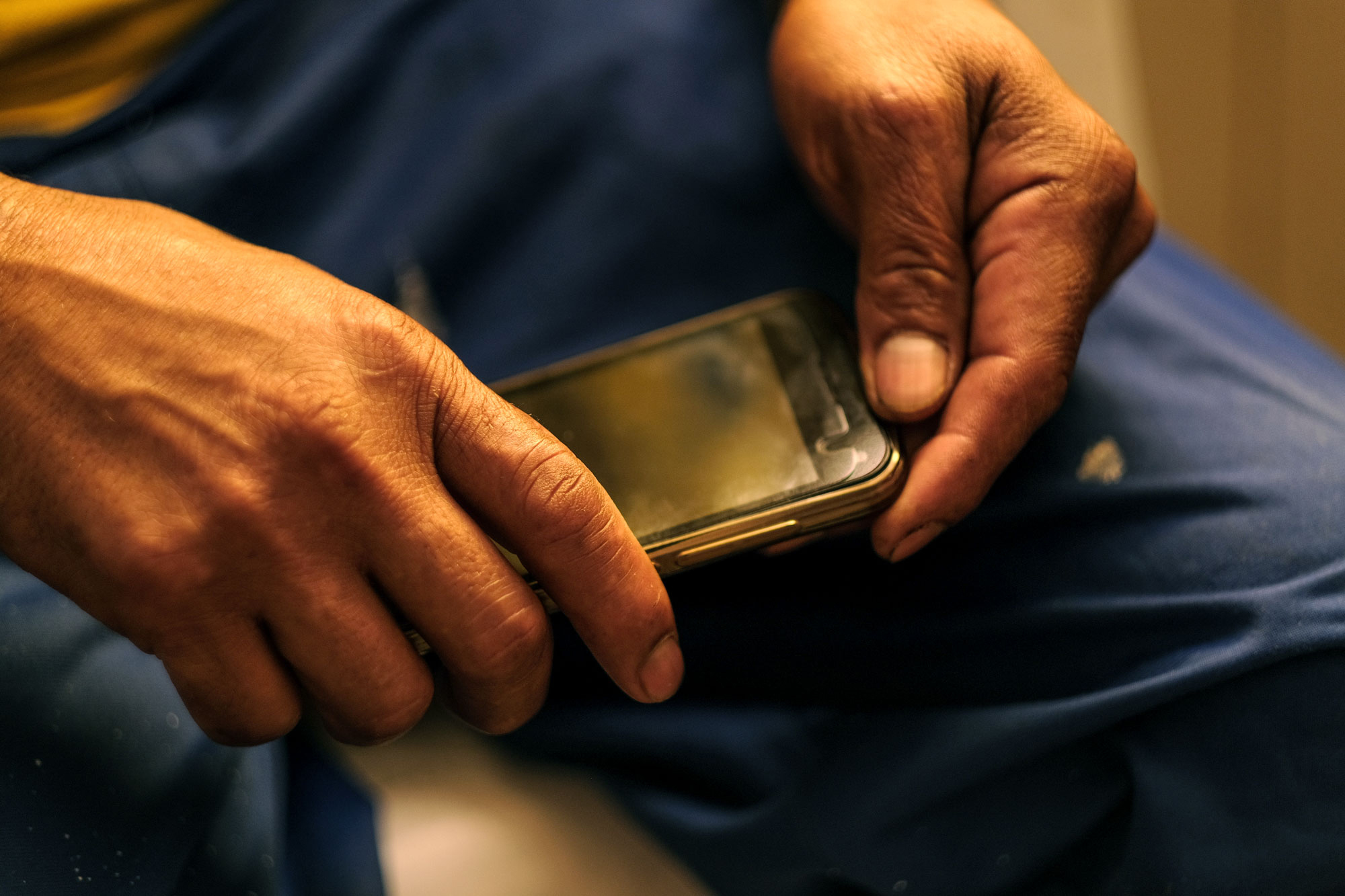
Carlos Castillo holds his smartphone in Alburgue sin Fronteras, a shelter for Venezuelan migrants in Lima, Peru. It’s how he stays connected to his wife and kids in Venezuela, Castillo says. Smartphones also are a crucial way migrants find information that helps them on their journeys. (Photo by Chloe Jones/Cronkite Borderlands Project)
‘The cellphone does everything’: Smartphones, internet access are key tools of 21st century migration
By Chloe Jones/ Cronkite Borderlands Project |
LIMA, Peru – Many of the more than 700,000 Venezuelans who have fled to Peru have arrived with next to nothing: a backpack, perhaps, carrying a toothbrush, a change of clothes and, most important, a cellphone. For most, their phones are lifelines.
“The Venezuelan has broken, has finished with that old adage that the best friend of man is the dog. For a Venezuelan, his best friend is the cellphone,” said Oscar Pérez, president of the Unión Venezolana en Perú.
Perez, an immigrant from Venezuela himself, would know. The nonprofit organization he leads has been at the forefront of assisting his compatriots in their resettlement in Peru. Its principal method of communication is the internet and social media.
“The Venezuelan may lack anything, but not a cellphone because the cellphone does everything,” Pérez said. “Schedule appointments for migration, schedule Interpol appointments, make bank transfers, talk to mom, cry with your wife, laugh with your children.”
That reliance on the cellphone is a key not only to keep in touch with family and friends but to guide refugees on their arduous paths to the countries where they are relocating. Even for the poorest of migrants, technology has changed the way people migrate in the 21st century.
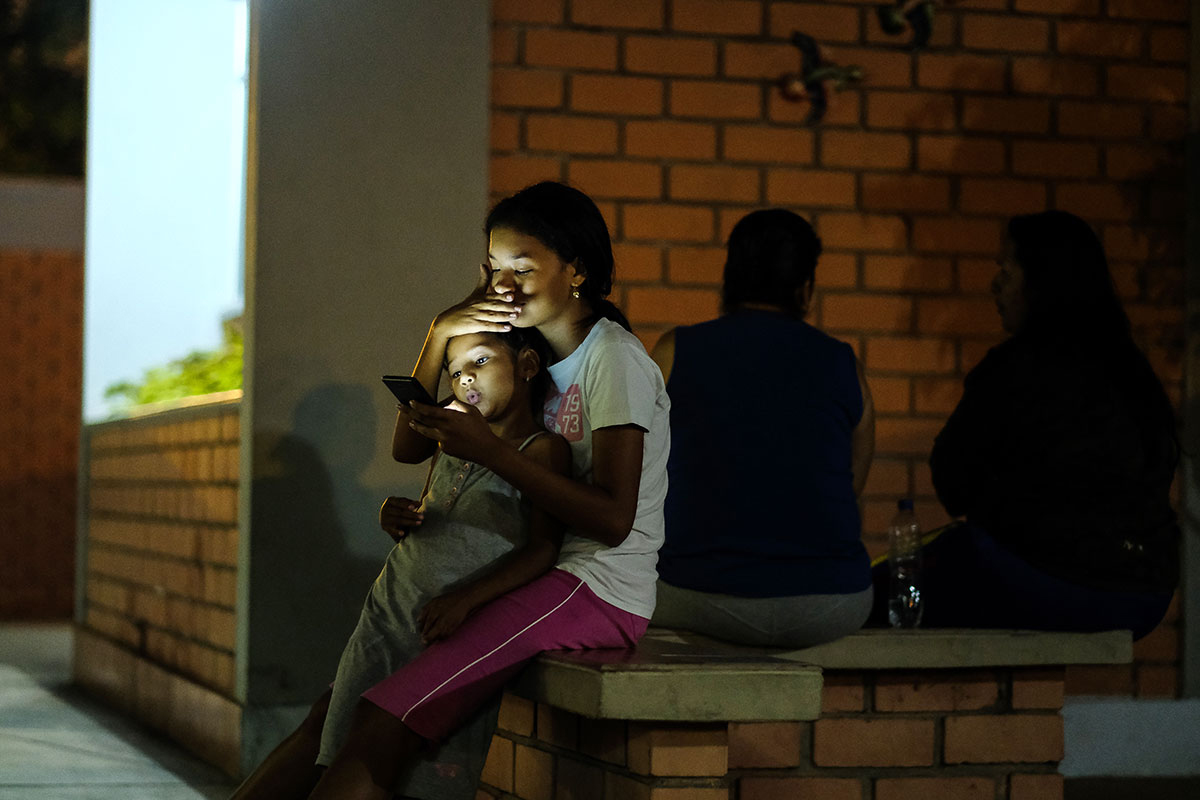
Andreina Iyala, 15, and another young girl check her phone in an UNHCR shelter in Lima, Peru. Smartphones can be a lifeline for migrants. (Photo by Chloe Jones/Cronkite Borderlands Project)
Meghan Benton, a senior analyst at the Migration Policy Institute in Washington, D.C., who specializes in migration and technology, said smartphones in particular are shaping migration journeys, and many migrants value a smartphone more than food, water and other basic necessities.
Before smartphones became widely available about a decade ago, migrants had almost no control over their journeys. Access to information and resources was limited, and migrants often were uncertain they’d ever see their families again.
The smartphone changed that, Benton said. The access to information and ability to stay in touch with family and friends back home empowers migrants and gives them a sense of security, a sense of control.
A downside migrants face using technology is access to too much information, but Benton said this is what empowers the modern-day migrant. Although misinformation is spread easily, migrants can choose what information they want to trust and fact-check rather than having to believe what they hear from the only source available to them at the time.
Those who mainly walked the more than 2,000 miles from Venezuela, through Colombia and Ecuador to reach Peru’s capital city often turned to bloggers and vloggers to share their experiences and give advice for migration. Numerous “Venezolanos en Perú” Facebook groups have hundreds of thousands of members, and there are hashtags that connect Venezuelans on Twitter and Instagram.
Buses, the principal means of transportation for many, are equipped with Wi-Fi and ways to charge electronics, allowing migrants to update friends and family about their journeys or to look for places to stay and work in their new country.
Once they arrive in Peru, many turn to Santos Guerra for advice on how to rebuild their lives.
Guerra, a Venezuelan, said he has been using the internet for decades and it has played a big role in his life. In 2006, he fell in love with a Peruvian woman he had met online. After a four-year long-distance relationship, they got married and decided to live in Venezuela. The weather was warmer and, Guerra said, the people were nicer.
After President Nicolas Maduro took power in 2013, he said, he began to notice a lack of basic necessities.
“I began to see many houses without any soap, shampoo, toothpaste, all the necessities, even toilet paper,” Guerra said. “I always said the day that the toilet paper runs out is the day the government falls.”
When his pantry was bare, he and his wife decided to move to Peru. Guerra said he used Google to learn how to make soap and, in 2015, began selling online and door-to-door in Venezuela to earn money to save for tickets to leave.
A year later, they did. His wife took a plane to Lima and Guerra took a bus so that he could care for his cats on the road. They’ve been living with his mother-in-law ever since.
It was easier to migrate to Peru because he’d been there many times before and had family there already.
“If you have not traveled outside Venezuela, you think that all the countries function the same,” Guerra said.
Because people are so desperate to leave, they believe everything they hear on the journey, he said. People would have different information on what documents were needed for which country, prompting some to change plans to avoid immigration officials, which resulted in them getting lost, even killed, or entering countries illegally.
So Guerra created his first Facebook group, “Venezolanos en Peru,” which attracted 750,000 members. He wanted to inform people what steps to take in immigrating and help them integrate in Peru. People would post advice, housing options and job opportunities, he said, but as the group grew, so did the number of “trollers” and misinformation.
In frustration, he deleted the group, vowing to never again manage a Facebook group with more than 100,000 people in it.
But he felt that he still had a helping hand to lend.
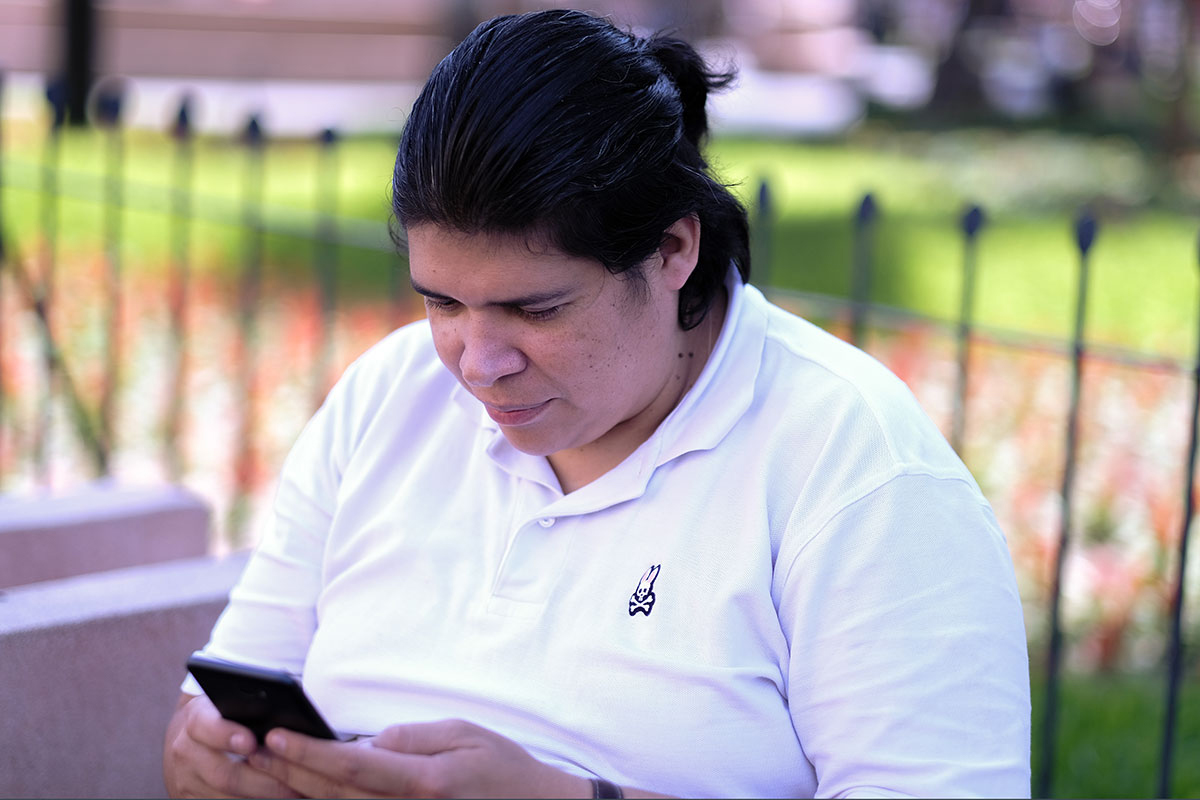
Santos Guerra is a Venezuelan blogger whose passion is helping people. He sees the potential of social media and the internet to help people in any crisis find information. (Photo by Chloe Jones/Cronkite Borderlands Project)
“I love helping people,” Guerra said. “Especially I love seeing that I can offer something to someone that can help them improve their life or acquire new knowledge and cause happiness to another person.”
He started a new blog, “Emigrar a Perú desde Venezuela,” which translates to “To migrate to Peru from Venezuela,” and a fan page for his blog called “Venezuela en Lima.” His blog and Facebook page together have reached more than 88,000 people in three months.
His blog covers a variety of topics, such as routes to travel, what documents are needed, how to open a bank account in Peru and cultural differences between the two countries.
Ángel Medina, a former journalist in Venezuela, and his wife in November 2017 began planning to seek political asylum in Peru, but his wife did not have a passport. They were actively using the internet to plan their trip and came across @peruzolanos – now known as @peruzolanosoficial – on the photo-sharing app Instagram.
The account offered useful information, including the average cost to travel to Peru from Cúcuta, a Colombian city bordering Venezuela, and how to enter Peru with or without a passport. Medina said the travel logs helped them make it to Lima in three and a half days, a trek that takes most Venezuelans six to seven.

Ángel Mendina came to Lima as a political asylee. He and his wife migrated to Lima when they saw the worth of a Peruvian sol versus a Venezuelan bolivar on the Instagram account @peruzolanos. (Photo by Chloe Jones/Cronkite Borderlands Project)
Medina uses Twitter to stay informed of developments in his home country because the government controls all Venezuelan television channels and newspapers.
“Twitter is our only communication weapon without regulation because they cannot regulate the internet,” he said.
As a freelance digital marketer, Medina studies social-media analytics and other digital measures to build strategies for his clients. Twitter is the best way to communicate because it is the quickest way to carry a message, he said.
Hazel Kwon, an assistant professor at Arizona State University whose research focuses on online communities, said digital communication, especially hashtags, plays a big role in mobilizing communities in crisis.
When a community in crisis communicates online, Kwon said, first there is panic, followed by rumor mongering and hashtags that are confusing and not helpful.
“Digital communities don’t really look that helpful to deal with the situation because it will aggravate the anxiety. But these online communities are resilient,” she said, adding that in crisis, these communities transform themselves from being messy to systematic.
Kwon said the hashtag becomes a core theme to develop new information sharing and discourse, “so there will be a shared way in dealing with the situation.”
#VenezolanosEnPeru and #VenezolanosEnLima are two hashtags that unite refugees in their new country. #LosBuenosSomosMás, which translates to “there are more of us who are good” is used to combat the xenophobia that many Venezuelans face in countries where they resettle. Kwon said hashtags can be symbolic of a movement, literal or social.
Although hashtags can crowd-source a large group of people quickly, people can leave just as quickly. Nothing is tying them to continue to engage with the hashtag or community after they make their post.
In Peru, Facebook searches keying on Venezuelans in the country turn up hundreds of pages and groups, the largest containing more than 330,000 members. Posts include Venezuelans looking to migrate, looking to find a place to stay, looking for work and looking for a friend.
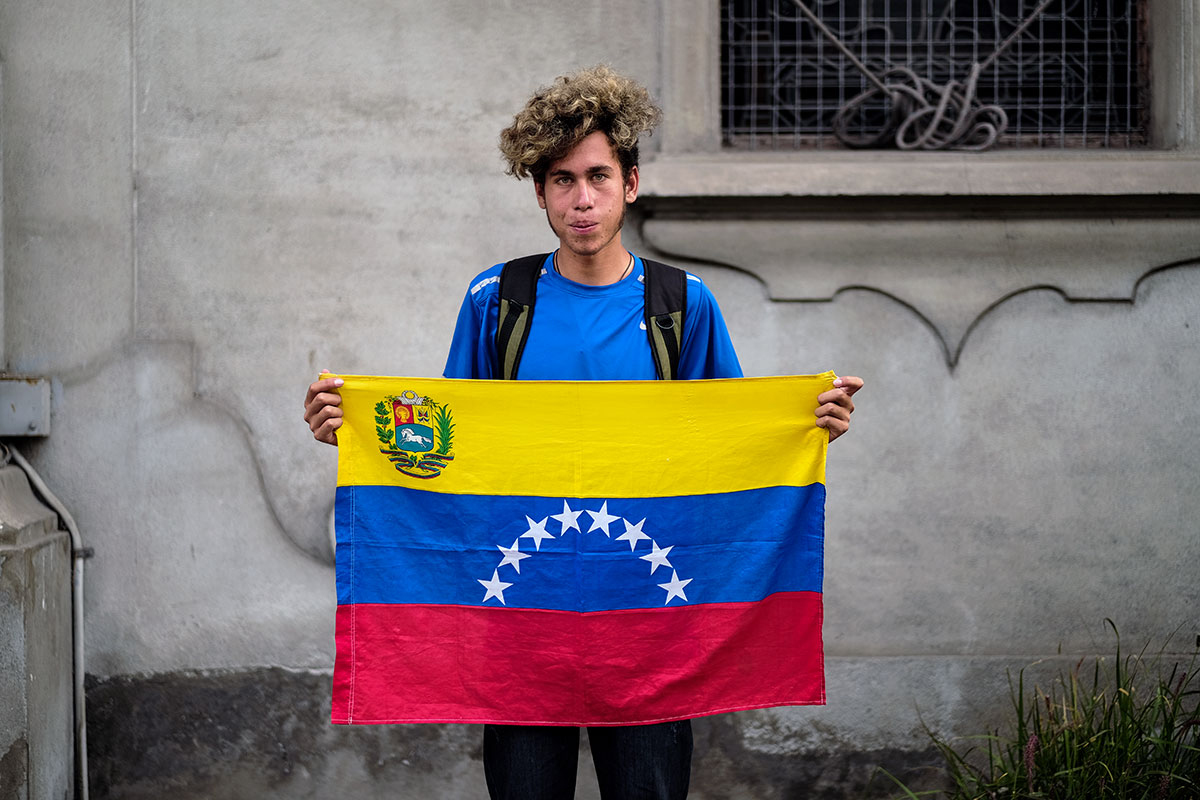
Eduardo José attributes his successful migration to Peru to social media. He found his route, housing and a job through Facebook and WhatsApp groups. (Photo by Chloe Jones/Cronkite Borderlands Project)
Desperate to escape a life of violence, poverty and malnourishment, Eduardo Jose, 20, followed advice from a friend he only knew through Facebook. He was told Peru was a land of opportunity, that he could better provide for his family, including his mother and brother. He said another brother died in 2016 because he couldn’t get the medical care he needed in Venezuela.
Jose joined various Facebook and WhatsApp groups that united Venezuelans in Peru. The one that helped him the most was “Venezolanos en Perú.”
“I asked, ‘How do I go from Cúcuta to get to Peru?’ and many people offered a log of what of what bus to take as I was going, what car to take, what fruit I could take in and what places I could stay,” Jose recalled.
His bus had Wi-Fi and internet, he said, so it was simple to keep in touch with family and friends on Facebook and WhatsApp.
Jose arrived in Peru in June 2018, malnourished and thin but full of hope.
“The way you see me right now is fat compared to when I arrived,” he said. “I had like a terrible anemia, the doctor simply said that he had never seen a case like mine.”
Jose’s bus dropped him off in a city three hours from Lima, at a house infested with bedbugs. He has Facebook to thank for his current home in Santa Anita, one of the districts in Lima. He posted in a group and, in less than five minutes, he said, there were over 300 comments. One of the people he arrived with added him to a different Facebook group that was specific for finding jobs.
“I now have a job thanks to the person that put me in that Facebook group,” he said.
Mariangie Tarzona arrived in Lima in February 2017 and attributes life in Peru as she knows it to the internet.
“I had Jesus in social networks,” Tarzona said, “I say that Facebook is the most important social network for us.”
In Venezuela, she used Facebook to barter for medicine, flour and other basic needs. And to plan her move to Lima.
“How much do you spend on your route? What was the best bus that you took? Where did you go to buy the bus ticket? How much did it cost you? What was the service like on it? How long did it take you to leave Venezuela? How is the border? How are you doing now?”
Tarzona said she found answers in a variety of Facebook groups.
Tarzona traveled by bus with her sister-in-law. In each country, they bought a cheap phone or chip and would connect to the Wi-Fi on the bus. When their phone had service, she said, there would be multiple messages from her parents and other family members who remain in Venezuela.
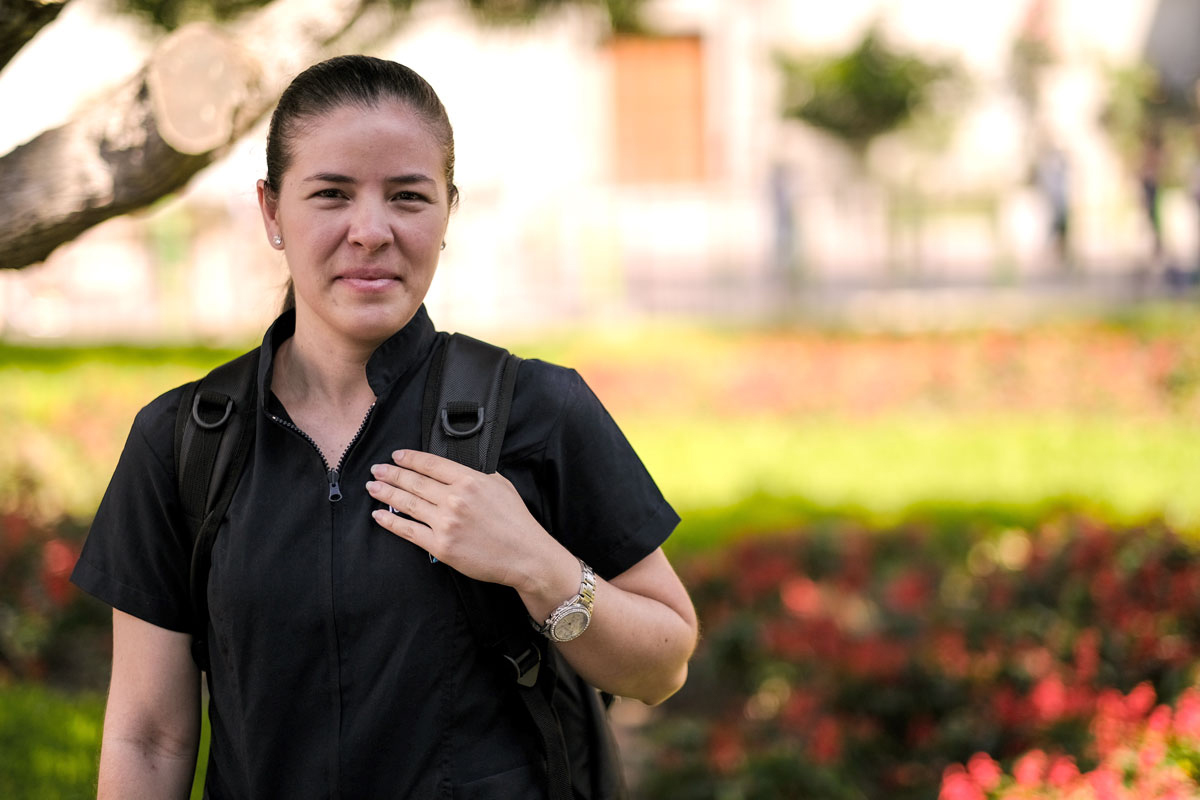
Mariangie Tarzona was a journalist in Venezuela and now lives in Lima. She says her phone is her lifeline to her family. (Photo by Chloe Jones/Cronkite Borderlands Project)
“Sometimes I do not sleep at night thinking about them,” Tarzona said, referring to her parents.
“They are the warmth of home,” she said after a pause, as a few tears trickled down her cheek. “No matter what fight you have in any country where you are migrating, you think about their welfare.”
She stays connected to her parents over WhatsApp and sends them money to help them survive. With Venezuela undergoing frequent electricity blackouts, such the weeklong outage in March, her parents keep in touch when they can.
After receiving a video of the neighborhood she grew up in during a blackout, she turned to Twitter to get the word out about what was happening in her homeland.
Así se vive en los hogares venezolanos con los apagones de horas, de días. Familias completas duermen fuera de sus casas. @chloeleejones @SergioNovelli pic.twitter.com/iJAOpOUMAS
— Mariangie Tarazona (@tarazona85) April 5, 2019
Valencia, Edo Carabobo. Y así es la misma realidad en los demás estados del país. @chloeleejones @SergioNovelli pic.twitter.com/Tn64g1trlR
— Mariangie Tarazona (@tarazona85) April 5, 2019
“This is how we live in Venezuelan homes with blackouts of hours, of days. Entire families sleep outside their homes,” read the tweet. “Valencia, Edo Carabobo. And this is the same reality in the other states of the country.”
She, like many other migrants, dreams of returning to Venezuela, of reuniting with her parents.
“I did not rule out the possibility of returning to my country, but not right now,” said Tarzona, holding back tears. “Unfortunately, it is 20 years of destruction. Twenty years. That does not leave. They are not going to recover right away when the regime falls.”
Cronkite Borderlands Project is a multimedia reporting program in which students cover human rights, immigration and border issues in the U.S. and abroad in both English and Spanish.

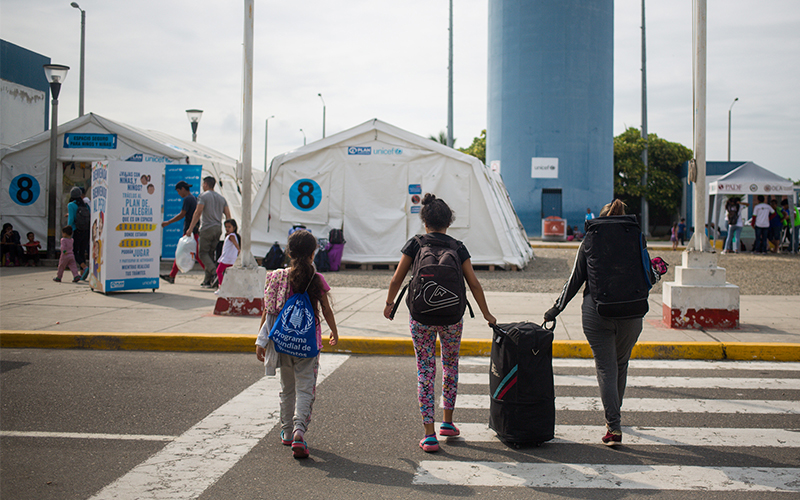
Leave a Comment
[fbcomments]